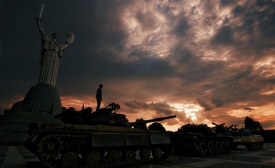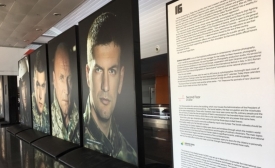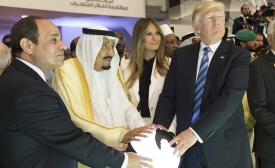ukraine
In the case of shared history, there is no way to suggest an appropriate narrative of any historical event that would be satisfactory for all counterparts. Digital rewriting, reevaluation, or reassertion of history is inevitability problematic. The only way to eliminate such conflicts and disconnect raised on social media is to emphasize “shared understanding and mutual openness.”

Olga Krasnyak discusses how disputes over historical memory in Russia and the Baltic States have played out on social media.
Some spokespersons have it tough. Think Sean Spicer trying to defend Donald Trump, Ron Ziegler defending Richard Nixon, maybe Dmitry Peskov fronting for Vladimir Putin. But the kind of tough job facing a spokesman that we should really respect is the one performed for the past three years by Col. Andriy Lysenko, spokesman of the Ukrainian armed forces. He comes daily to the Ukraine Crisis Media Center in downtown Kyiv and reports on-the-record on the state of the war in Ukraine’s eastern regions.

Mark Dillen on Ukraine's method of providing public information about the war.
Three years into the war in Ukraine, international attention and aid to displaced people has waned. In an area near the war zone, Natasha Bluth reports on volunteer groups trying to fill gaps in support for one of the world’s largest internally displaced populations.Many Ukrainian community organizations, inspired by the Euromaidan protests that called for improved human rights and better ties with Europe, have expanded since the conflict began, including local NGO Ulybka rebenka, or Smile of a Child, which was founded a year earlier to aid disadvantaged children.

Mark Dillen on the negative image of President Trump's first trip overseas.
Ukraine’s bid to eventually join the European Union wins a critical vote, a victory in its war against Russia and for democratic values. [...] At a time when three major countries are pulling away from Europe, Ukraine’s eagerness to embrace the EU and its values shows how much other countries want in. [...] For others outside the EU, however, the allure is a deeper theme, that of civic values such as equality and openness. And they are willing to make big sacrifices to join the Continent’s biggest club.
Public diplomacy has always been an essential part of NATO’s mission. NATO (the North Atlantic Treaty Organization) understands that in order to keep our people safe and to protect the values we hold dear – democracy, individual liberty, human rights and the rule of law – we must have the support of the public. Public diplomacy is about making sure that the public understands what NATO is, what it wants to achieve, and how it tries to achieve it.







